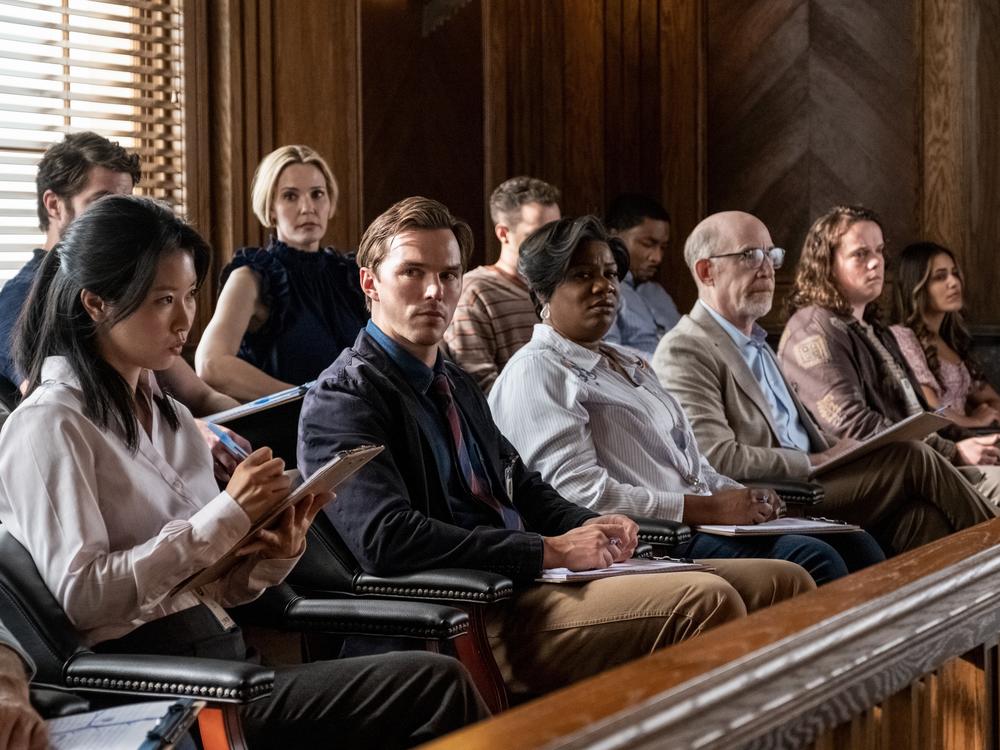Section Branding
Header Content
'Juror #2' is a thorny legal thriller — and possibly Clint Eastwood's last film
Primary Content
Last week, Warner Bros. opened Juror #2 in limited release, with minimal fanfare, and no plans to report the film's domestic box office. It's not the typical treatment for a Clint Eastwood movie, especially one that some think might be the last Clint Eastwood movie. I hope they’re wrong. Either way, the fact that Eastwood's longtime studio would bury his latest speaks to the various crises that have befallen the industry in general and Warner Bros. in particular. At 94, Eastwood seems ever more like an anomaly in American filmmaking: a Hollywood legend with nothing left to prove, still cranking out his unfussy, mid-budget dramas for a grown-up audience that the major studios have all but abandoned.
Juror #2 is actually one of his better-directed efforts of late, certainly compared with recent disappointments like Cry Macho and The Mule. There's a little old-school John Grisham in this movie’s legal-thriller DNA, even though it features an original screenplay, by Jonathan Abrams.
Nicholas Hoult stars as Justin Kemp, a Georgia-based magazine writer who’s expecting a baby with his wife, played by Zoey Deutch. It's a high-risk pregnancy, and so the timing isn't ideal when Justin gets selected as a juror in a major murder trial.
The defendant, James Sythe, stands accused of killing his girlfriend, Kendall Carter, after the two had a heated argument in a bar one night. As the facts of the case emerge, Justin, who is recovering from alcoholism, realizes that he was at that same bar on the very night in question — and that he hit something he had assumed was a deer while driving home.
Suddenly alarmed that he could be more involved in Kendall's death than he thought, Justin seeks advice from his AA sponsor, Larry, who also happens to be a lawyer. Larry, played by Kiefer Sutherland, advises Justin to keep quiet, lest he face serious prison time. But Justin, worried that his silence could send an innocent man to prison, tries to plead Sythe’s case during deliberations, which quickly turn contentious.
There’s a creakiness to the writing here; the bickering sounds forced, and some of the jurors veer toward cultural stereotypes. But others are more sharply drawn: J.K. Simmons brings his hard-nosed intelligence to the role of one of Justin’s few allies, while Cedric Yarbrough finds the simmering tension in every line as a juror convinced of the defendant’s guilt.
It all plays like a barbed riff on 12 Angry Men, where one man seeks to sway his fellow jurors, not to bring about justice so much as assuage his own conscience. But Justin isn’t the only character held up for moral scrutiny. The courtroom’s most compelling figure is the prosecutor, Faith, played with terrific nuance by Toni Collette. Faith does her job with skill, integrity and a great deal of ambition; she’s running for district attorney, and she knows that securing a conviction could help her chances.
Collette and Hoult played a mother and son in the 2002 comedy About a Boy. And while the actors don’t share too much screen time in Juror #2, beyond one doozy of a late scene, it’s still a pleasure to see them reunited more than 20 years later. Hoult is especially strong as a man wrestling quietly with past demons and present dilemmas, and whose response is to rationalize like crazy. After all, maybe Sythe, a man known for his rough past, really did kill his girlfriend. And even if he didn’t, how can Justin turn himself in, just as he and his wife are about to start a family?
Eastwood may take his characters to task, but he also sees the bigger picture. He’s long had a skeptical view of institutions and their failings, whether it’s a corrupt police force in Changeling or the manipulations of the media in movies like Sully and Richard Jewell. In Juror #2, he takes measured aim at the American justice system, from the dogged attorneys muddling their way through the evidence to the exhausted jurors who just want to deliver a quick verdict to the procedural fault lines and blind spots that can make the truth seem so elusive.
It’s a thorny, thoughtful film, and I wish its own studio had more confidence in it. If Eastwood does make another one, I wouldn’t mind seeing him take on another broken American system rife with cynicism, self-interest and compromise — and that, of course, is Hollywood itself.

